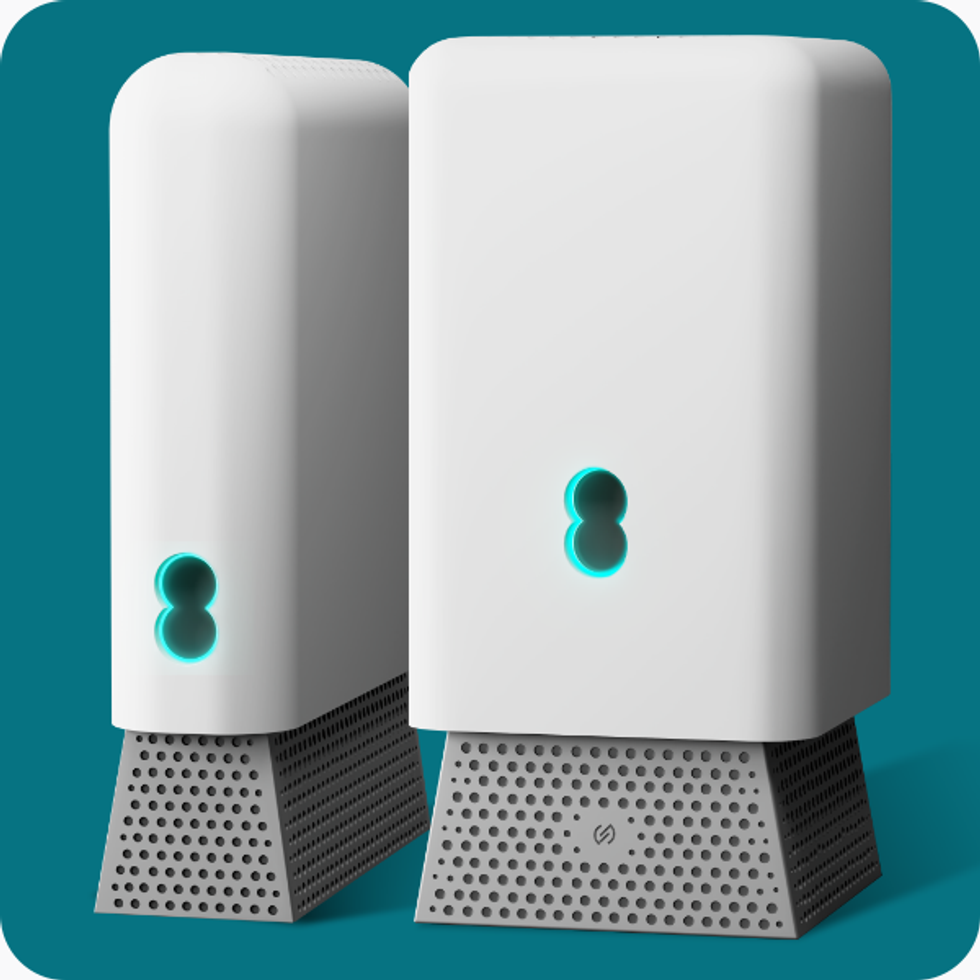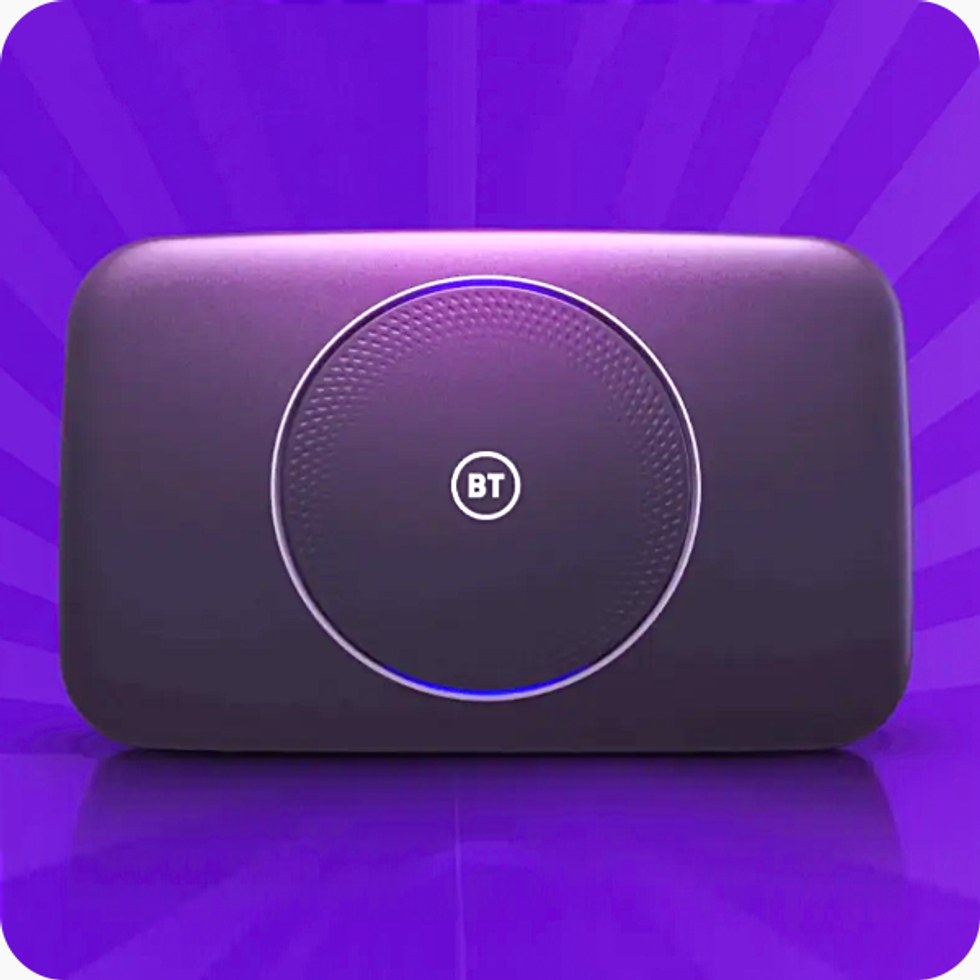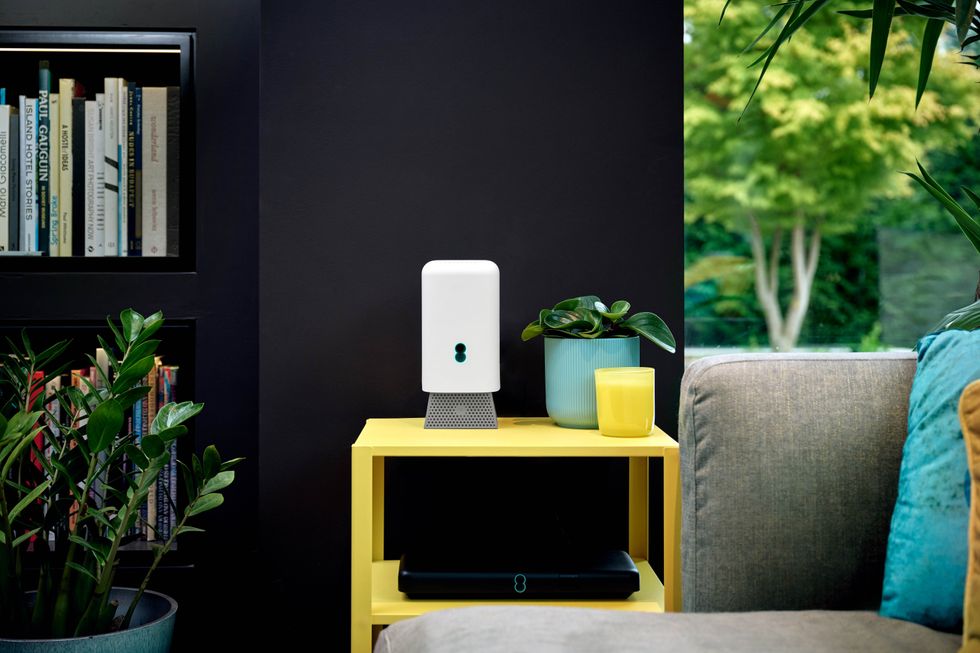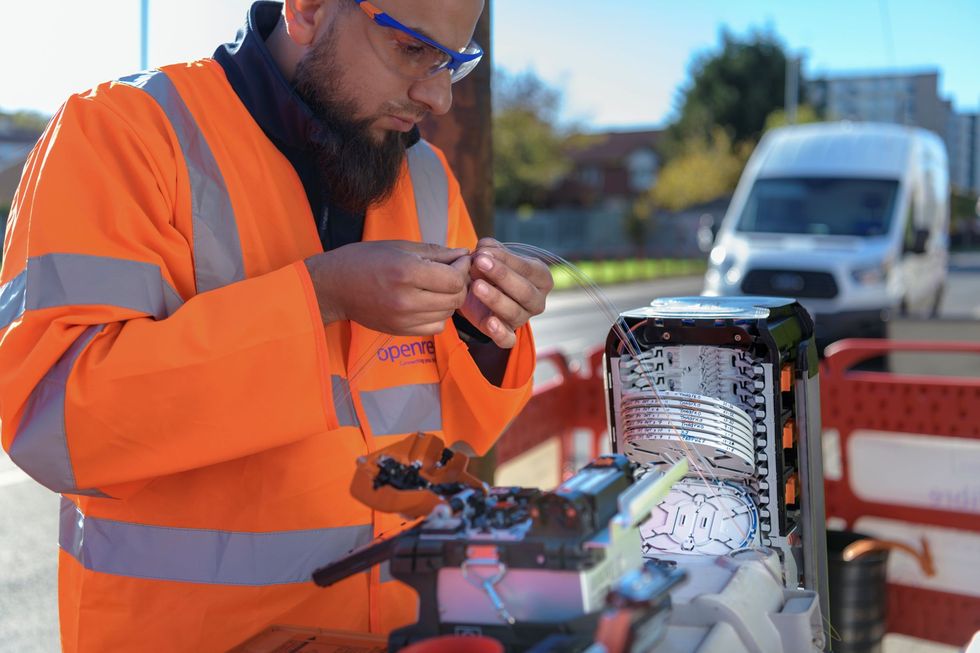
EE is offering broadband for £0 for the next three months. Full-fibre internet offers faster download speeds and more reliable connections, perfect to stream live television in 4K Ultra HD, wireless web browsing, play video games
EE PRESS OFFICE

All products and promotions are independently selected by our experts. To help us provide free impartial advice, we will earn an affiliate commission if you buy something. Click here to learn more
Unlock £300 to cover early exit fees if you're not able to switch right away
- April is when broadband companies increase their prices
- Most Britons will see costs rise between £2 - £3.50 each month
- Millions could unlock cheaper prices if they switch, Ofcom says
- BT and EE offer 3 months of free broadband for newcomers
- Both brands have waived set-up fees too
Don't Miss
Most Read
Trending on GB News
Chances are, your broadband bills will increase this month.
The biggest UK broadband providers will charge between £2 - £3.50 extra, or raise subscriptions between 4.5 - 7.5%. The price hike that applies to your broadband will depend on the supplier and when you signed-up.
We've explained the exact price rise coming to BT, Sky, TalkTalk, Plusnet, and EE broadband customers. According to data published by Ofcom, some 7.4 million UK households are currently out of contract and could switch to a new subscription with no repercussions.
If you're outside of the minimum contract term, you can switch to another broadband supplier — and benefit from the biggest discounts, typically reserved for new customers. You can usually check the status of your ongoing contract by asking your broadband provider – over the phone or live chat – or logging into your online account.
If you're ready to switch — you can secure three months of free broadband.
Switch to EE and you'll pay £0 for the first three months on any of its fast full-fibre broadband plans. That means you won't have to spend anything on broadband until July or August at the very earliest.
After that, EE will charge £32.99 for its Full Fibre 150 package. That includes download speeds of 149Mbps — with a speed guarantee of 100Mbps, unlimited download limits, and no upfront costs.
Pay £0 for EE full-fibre broadband

For a limited time, EE is offering free broadband for the first 3 months of your contract. Available on full-fibre packages starting from £32.99, which unlocks the Full Fibre 150 plan, up to the all-singing, all-dancing Made For Gamers package with the new Wi-Fi 7 hub included as standard. If you're not outside of your current contract, EE will contribute up to £300 towards early exit fees
EE Full Fibre 150
$32.99
$0
Full Fibre 500 Essentials costs £39.99 after three months of £0 bills, and unlocks average download speeds of 500Mbps with a guaranteed minimum speed of 425Mbps even at peak times. Likewise, there's no upfront cost.
EE has included its all-singing, all-dancing Made For Gamers plan. After three months of free broadband, EE subscribers will be charged £80.99 a month for this blockbuster package, which includes 1.6Gbps downloads — the fastest speeds available nationwide from a major provider, Xbox Game Pass Ultimate subscription (worth £14.99 a month), and its newest Wi-Fi 7 router.
EE is one of the only nationwide broadband providers that offers a Wi-Fi 7 router bundled with its full-fibre internet connections. For comparison, you'll need to spend £170 to buy a Wi-Fi 7 router from Amazon-owned eero to upgrade your wireless network with the latest speeds, which offer improved performance.
If you've got a few months left of your current broadband deal, EE will contribute up to £300 towards any early exit fees. That means you'll be able to switch ahead of schedule and not miss the latest free full-fibre deal.
EE isn't alone with its free broadband deal, BT will also waive broadband bills for the first three months of your new contract. That means you won't spend a penny on internet until July or August at the earliest.
BT can't match the 1.6Gbps download speeds available with EE.
Pay £0 for BT full-fibre broadband

Enjoy £0 broadband for the first three months of your new contract. BT broadband starts from £31.99 for download speeds of 50Mbps, rising to £39.99 for Full Fibre 500 with 500Mbps speeds. BT has waived its upfront cost for even bigger savings, and will contribute up to £100 towards early exit fees.
BT Fibre 1
$0
$31.99
However, BT broadband plans start from £31.99 — £1 less than the lowest-cost plan from EE.
That unlocks BT Fibre 1, with 50Mbps download speeds. That's less than the UK household average of 69Mbps, so if you regularly stream boxsets, play multiplayer games online, or make video calls... you might want to avoid.
BT Full Fibre 100 costs £32.99 and unlocks 149Mbps download speeds. There's no upfront cost and BT will guarantee a minimum speed of at least 100Mbps, with the ability to leave without exit fees if the company cannot match these speeds at peak time.
BT Full Fibre 500 is the fastest package included in the three-month free broadband deal. There's no upfront cost, and a speed guarantee of 425Mbps.
After the three months with £0 bills, BT will charge £39.99.
All of the above deals are limited to areas covered by Openreach's full-fibre connections. Earlier this year, the BT-owned company revealed that 17 million homes across the UK have now been upgraded to the speediest full-fibre internet connection. These next-generation connections offer download speeds up to 1,800Mbps.
Fibre-optic cables deliver faster download and upload speeds, as well as improved reliability compared to traditional internet services.
Connections are less likely to be disrupted by bad weather conditions, and you won't see speeds dip at peak times, when all of your neighbours are trying to stream a boxset at the same time.
 To unlock the more reliable, faster Wi-Fi 7 wireless network, you'll need to use the all-new Smart Hub Pro Wi-Fi router designed by the teams at EE and powered by internals from Qualcomm EE PRESS OFFICE
To unlock the more reliable, faster Wi-Fi 7 wireless network, you'll need to use the all-new Smart Hub Pro Wi-Fi router designed by the teams at EE and powered by internals from Qualcomm EE PRESS OFFICE According to figures published by Ofcom, the average home broadband speed in the UK sits at roughly 69Mbps. If you upgrade to any of the 500Mbps full-fibre plans listed above, you'll enjoy 7x faster download speeds — meaning you can stream high-quality video, back-up photos to the cloud, download software updates, and make video calls with friends and family anywhere in the world without any buffering.
If you're unsure about what broadband speed you need in your home. We've put together the average download speeds for an hour-long television show episode in Standard Definition (SD), roughly 450MB in size.
- 69Mbps, the average broadband speed in the UK: 56 seconds
- 150Mbps, the lowest speed available with most full-fibre packages: 24 seconds
- 500Mbps, widely available from all full-fibre providers: 7 seconds
- 1Gbps (or 1,000Mbps) is not available from all broadband companies: 4 seconds

An Openreach engineer is pictured installing fibre-optic cables to an exchange location
BT PRESS OFFICESome of the biggest broadband providers in the UK rely on infrastructure from Openreach, including BT, EE, Sky, TalkTalk, and Plusnet. If you're able to access gigabit-capable broadband from any of these companies, you should be able to maintain those speeds when you switch to another.
Openreach aims to fit 25 million homes and businesses with full-fibre connections by 2026, rising to 30 million by the end of the decade. Given that BT-owned Openreach was able to connect 4.2 million premises to its Ultrafast Full Fibre network in 2024 — equivalent to a new connection every eight seconds.
However, not every broadband brand relies on Openreach.
Virgin Media maintains its own dedicated fibre network, which offers download speeds of up to 1,130Mbps to roughly 16 million homes, plus there are a number of other smaller brands building their own infrastructure to connect to customers directly, including Community Fibre, HyperOptic, and G.Network.
Despite the smaller footprint of these full-fibre suppliers, they're proving increasingly popular with British households looking for alternatives from the biggest brands.
Under the One Touch Switch system, which made its debut in September 2024, switching between any of the broadband brands listed above is much, much easier.
Under this simplifed system, customers only need to contact their new provider, which will handle the entire switching process, including liaising with the existing provider.
If that sounds familiar, it's likely because the process of switching between broadband brands running on BT-owned Openreach cables has been like this for years, but it was moving between different full-fibre networks, from Openreach to Virgin Media for example, where customers would need to contact multiple customer service teams and organise the switchover date themselves.
LATEST DEVELOPMENTS
- Google Pixel 9a announced with 100-hour battery life and low price
- Best Sky Glass deals
- EE unleashes upgrade to 28 million people across UK at no extra cost
- Samsung just confirmed when your phone will unlock free upgrade
- Best VPN deals
Bringing the same hassle-free switching that's existed between Openreach-powered brands since 2013 should remove almost all fears about switching broadband providers — being left without a connection for weeks, evenings spent on the phone to arrange a date for an engineer appointment, paying two broadband bills because the cut-off date and start of your new contract didn't line-up perfectly.
Ahead of the (long-delayed) launch of One Touch Switch, Ofcom released data that showed four in 10 people (41%) in the UK would decide against switching because of the headache of having to contact more than one provider. A similar number (43%) told the regulator they were put off switching because it seemed too time-consuming.
And of those who had decided to switch, almost a quarter (24%) who reached out to their current provider faced unwanted attempts to persuade them to stay. Under the new system, you only need to sign-up to a broadband deal with the new provider, who will handle the switchover date and admin with your current internet supplier behind the scenes.







